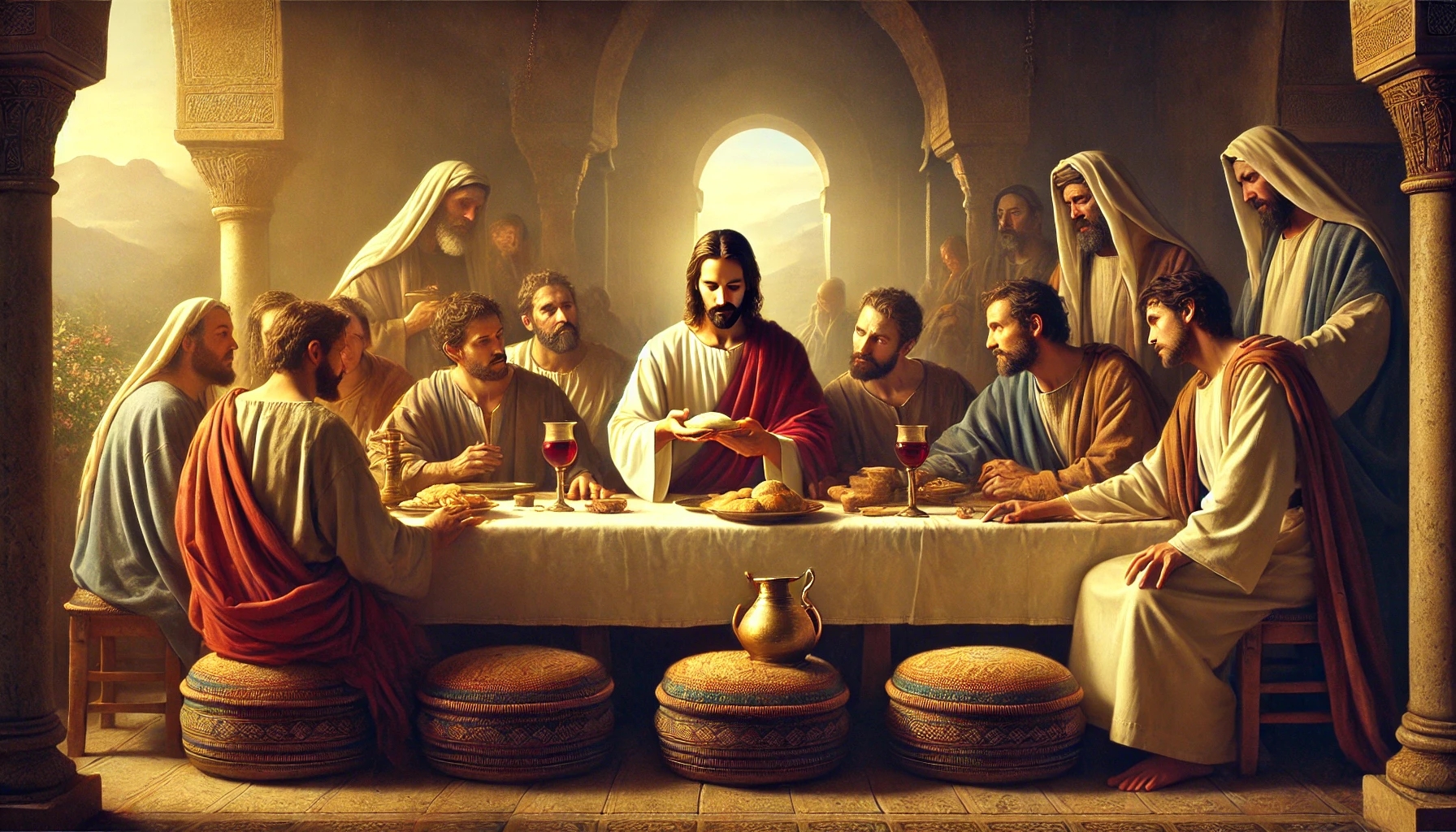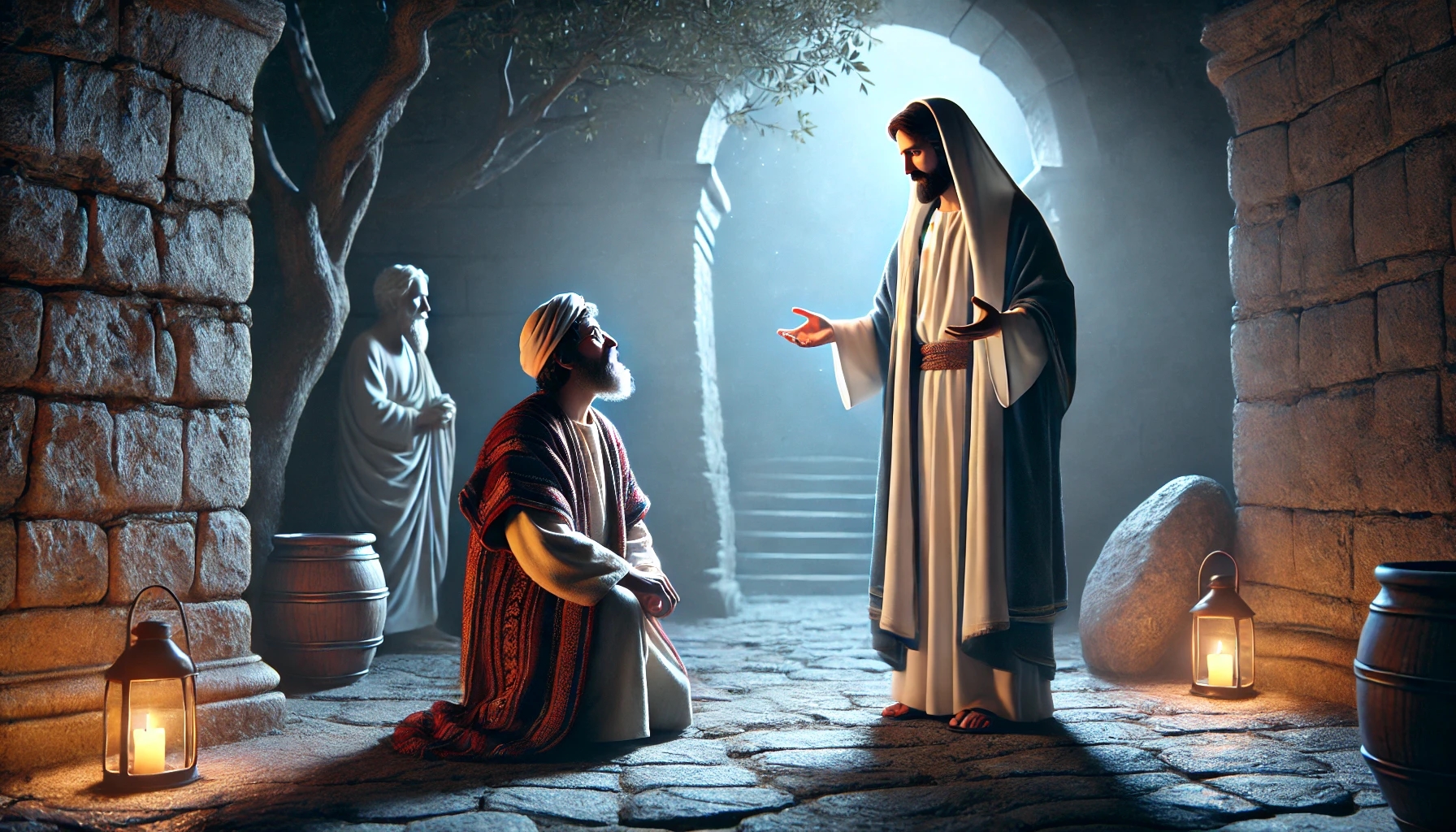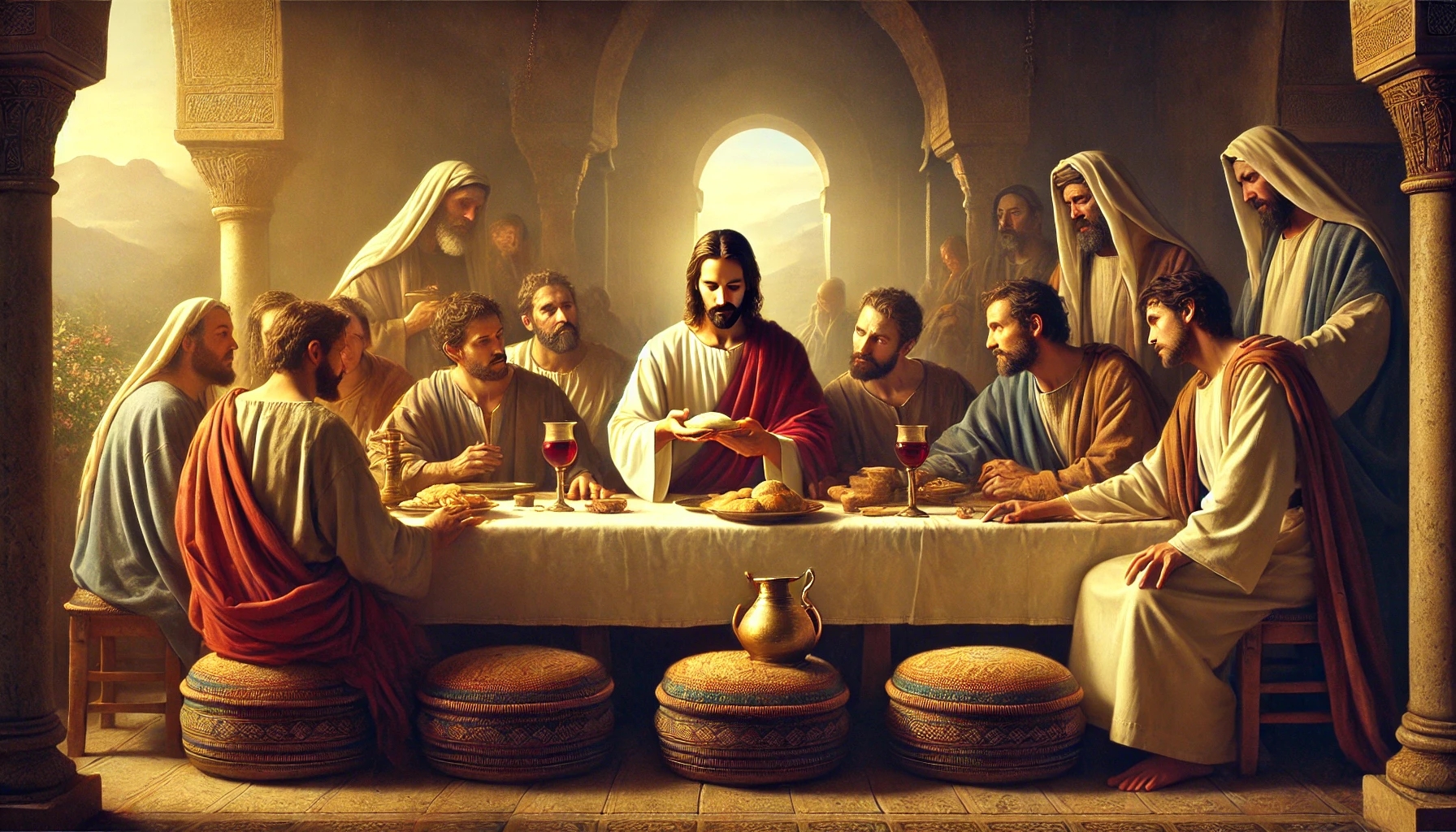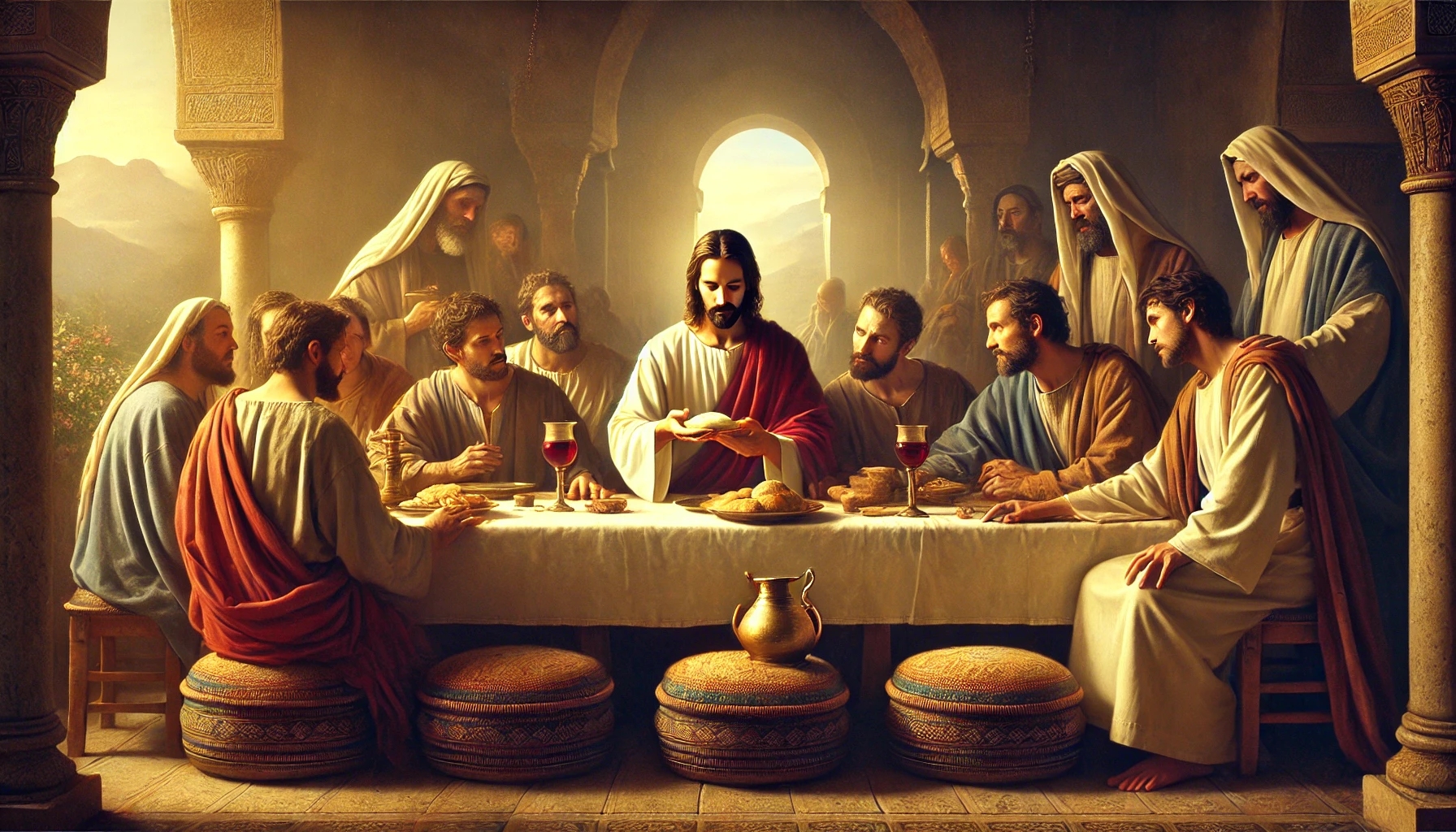October 25, 2024
DAILY BIBLE READING – John Chapter 19
1 Then Pilate therefore took Jesus, and scourged him.
2 And the soldiers platted a crown of thorns, and put it on his head, and they put on him a purple robe,
3 And said, Hail, King of the Jews! and they smote him with their hands.
4 Pilate therefore went forth again, and saith unto them, Behold, I bring him forth to you, that ye may know that I find no fault in him.
5 Then came Jesus forth, wearing the crown of thorns, and the purple robe. And Pilate saith unto them, Behold the man!
6 When the chief priests therefore and officers saw him, they cried out, saying, Crucify him, crucify him. Pilate saith unto them, Take ye him, and crucify him: for I find no fault in him.
7 The Jews answered him, We have a law, and by our law he ought to die, because he made himself the Son of God.
8 When Pilate therefore heard that saying, he was the more afraid;
9 And went again into the judgment hall, and saith unto Jesus, Whence art thou? But Jesus gave him no answer.
10 Then saith Pilate unto him, Speakest thou not unto me? knowest thou not that I have power to crucify thee, and have power to release thee?
11 Jesus answered, Thou couldest have no power at all against me, except it were given thee from above: therefore he that delivered me unto thee hath the greater sin.
12 And from thenceforth Pilate sought to release him: but the Jews cried out, saying, If thou let this man go, thou art not Caesar’s friend: whosoever maketh himself a king speaketh against Caesar.
13 When Pilate therefore heard that saying, he brought Jesus forth, and sat down in the judgment seat in a place that is called the Pavement, but in the Hebrew, Gabbatha.
14 And it was the preparation of the passover, and about the sixth hour: and he saith unto the Jews, Behold your King!
15 But they cried out, Away with him, away with him, crucify him. Pilate saith unto them, Shall I crucify your King? The chief priests answered, We have no king but Caesar.
16 Then delivered he him therefore unto them to be crucified. And they took Jesus, and led him away.
17 And he bearing his cross went forth into a place called the place of a skull, which is called in the Hebrew Golgotha:
18 Where they crucified him, and two other with him, on either side one, and Jesus in the midst.
19 And Pilate wrote a title, and put it on the cross. And the writing was Jesus Of Nazareth The King Of The Jews.
20 This title then read many of the Jews: for the place where Jesus was crucified was nigh to the city: and it was written in Hebrew, and Greek, and Latin.
21 Then said the chief priests of the Jews to Pilate, Write not, The King of the Jews; but that he said, I am King of the Jews.
22 Pilate answered, What I have written I have written.
23 Then the soldiers, when they had crucified Jesus, took his garments, and made four parts, to every soldier a part; and also his coat: now the coat was without seam, woven from the top throughout.
24 They said therefore among themselves, Let us not rend it, but cast lots for it, whose it shall be: that the scripture might be fulfilled, which saith, They parted my raiment among them, and for my vesture they did cast lots. These things therefore the soldiers did.
25 Now there stood by the cross of Jesus his mother, and his mother’s sister, Mary the wife of Cleophas, and Mary Magdalene.
26 When Jesus therefore saw his mother, and the disciple standing by, whom he loved, he saith unto his mother, Woman, behold thy son!
27 Then saith he to the disciple, Behold thy mother! And from that hour that disciple took her unto his own home.
28 After this, Jesus knowing that all things were now accomplished, that the scripture might be fulfilled, saith, I thirst.
29 Now there was set a vessel full of vinegar: and they filled a spunge with vinegar, and put it upon hyssop, and put it to his mouth.
30 When Jesus therefore had received the vinegar, he said, It is finished: and he bowed his head, and gave up the ghost.
31 The Jews therefore, because it was the preparation, that the bodies should not remain upon the cross on the sabbath day, (for that sabbath day was an high day,) besought Pilate that their legs might be broken, and that they might be taken away.
32 Then came the soldiers, and brake the legs of the first, and of the other which was crucified with him.
33 But when they came to Jesus, and saw that he was dead already, they brake not his legs:
34 But one of the soldiers with a spear pierced his side, and forthwith came there out blood and water.
35 And he that saw it bare record, and his record is true: and he knoweth that he saith true, that ye might believe.
36 For these things were done, that the scripture should be fulfilled, A bone of him shall not be broken.
37 And again another scripture saith, They shall look on him whom they pierced.
38 And after this Joseph of Arimathaea, being a disciple of Jesus, but secretly for fear of the Jews, besought Pilate that he might take away the body of Jesus: and Pilate gave him leave. He came therefore, and took the body of Jesus.
39 And there came also Nicodemus, which at the first came to Jesus by night, and brought a mixture of myrrh and aloes, about an hundred pound weight.
40 Then took they the body of Jesus, and wound it in linen clothes with the spices, as the manner of the Jews is to bury.
41 Now in the place where he was crucified there was a garden; and in the garden a new sepulchre, wherein was never man yet laid.
42 There laid they Jesus therefore because of the Jews’ preparation day; for the sepulchre was nigh at hand.
King James Version. Public Domain
Commentary
Introduction:
John Chapter 19 describes the end of Jesus’ earthly life and marks the climax of His journey of suffering. It begins with His scourging and mockery, continues with His condemnation by Pilate, and concludes with the crucifixion and His death at Golgotha. Despite the agony that Jesus endures, His sacrifice remains a profound sign of divine love and obedience. This chapter powerfully illustrates how Jesus fulfills the divine plan of redemption while those around Him act with injustice, betrayal, and fear.
Commentary:
John 19 begins with the brutal scourging of Jesus by the Roman soldiers. The crown of thorns they place on His head and the purple robe they drape over Him are clear signs of the mockery with which they ridicule Him as the “King of the Jews.” This act of derision demonstrates the deep contempt that both the Jewish leaders and the Roman soldiers held for Him. Nevertheless, Jesus remains calm and silent amid this suffering, highlighting His determination to fulfill the will of His Father. The contrast between His passive submission and the active cruelty of those around Him is striking. His silent patience, even in the face of the most severe physical and emotional abuse, speaks to Jesus’ profound inner strength and His dedication to the divine plan.
Pilate’s role in this chapter is ambivalent and tragic. Multiple times he attempts to release Jesus, finding no guilt in Him, yet he becomes increasingly pressured by the Jewish crowd and their religious leaders. It is particularly noteworthy how Pilate’s fear escalates when he hears that Jesus has declared Himself the “Son of God” (John 19:7-8). This designation awakens a deeper fear in Pilate that goes beyond the political—perhaps he senses a hint of the truth that Jesus embodies. Nevertheless, he cannot withstand the pressure. Pilate’s famous question, “What is truth?” (John 18:38) from the previous chapter takes on a tragic dimension here. Although he has the truth before him, he ultimately decides to hand Jesus over to crucifixion out of political calculation and fear of a revolt.
The crucifixion itself is not only a cruel punishment but also the fulfillment of many Old Testament prophecies. The description of Jesus carrying His cross and being crucified at Golgotha signifies His complete dedication and obedience to God’s will. John mentions two other individuals being crucified alongside Jesus, but the focus remains on Jesus, who hangs in the center. The fact that Pilate has the inscription “Jesus of Nazareth, the King of the Jews” placed above the cross in three languages is symbolically significant. It indicates that Jesus’ work has universal importance—it is not directed only at the Jews but at all of humanity.
The division of Jesus’ garments among the soldiers fulfills another Old Testament prophecy mentioned in Psalm 22:18: “They divide my clothes among them and cast lots for my garment.” This moment emphasizes the complete humiliation and degradation Jesus experiences during His crucifixion, yet He remains the sovereign King and the true Redeemer.
A particularly moving scene is when Jesus, from His cross, cares for His mother. He instructs John, “the disciple whom He loved,” to take Mary as His mother, and Mary to take John as her son (John 19:26-27). This act of care, even amidst His suffering, demonstrates Jesus’ deep compassion and concern for those close to Him. This too is a sign of His divine love, manifested not only in His sacrifice but also in the small, personal moments.
When Jesus finally dies, He cries out, “It is finished!” (John 19:30). This statement encapsulates the entire work of redemption. Jesus has completed His mission—He has paid the price for humanity’s sins and paved the way for reconciliation between God and mankind. With this death, not only does His earthly life end, but also the old covenant. Through His death, Jesus establishes a new covenant in which people have direct access to God without the mediating role of the Old Testament priesthood.
Another remarkable detail in this chapter is that the soldiers do not break Jesus’ legs because He is already dead, and one of the soldiers pierces His side with a spear, resulting in the flow of blood and water. This scene fulfills two more prophecies: “None of his bones will be broken” (from Psalm 34:20) and “They will look on the one they have pierced” (from Zechariah 12:10). Here again, the continuity between the Old and New Testaments is evident—everything that happens to Jesus is part of the divine plan.
The chapter concludes with the burial of Jesus, organized by Joseph of Arimathea and Nicodemus. These two men, who had previously kept their discipleship secret out of fear of the Jews, now bravely come forward to prepare a proper burial for Jesus. Their actions testify to the profound impact Jesus had on those who truly recognized Him.
Summary:
John 19 describes the final hours of Jesus’ life, beginning with His scourging and mockery, leading up to His crucifixion and death. Despite the brutal treatment, Jesus remains calm and fulfills the divine plan of redemption. Pilate makes several attempts to release Him but ultimately succumbs to the pressure from the Jewish leaders and the crowd, handing Jesus over to be crucified. Jesus dies at Golgotha, proclaiming, “It is finished,” which concludes His mission to save humanity. The prophecies of the Old Testament are fulfilled in these events, and Jesus is ultimately buried by Joseph of Arimathea and Nicodemus.
![]()

WEEKLY SPIRIT OF PROPHECY READING – Ellen White | The Desire of Ages
Chapter 72—“In Remembrance of Me”
This chapter is based on Matthew 26:20-29; Mark 14:17-25; Luke 22:14-23; John 13:18-30.
Read online here
Commentary
Introduction
Chapter 72 deals with one of the most central moments in the life of Jesus and Christian theology: the institution of the Lord’s Supper, which Jesus celebrated with His disciples during the Passover festival. This moment, described in the Gospels of Matthew, Mark, Luke, and John, marks the transition from the Jewish tradition of Passover to a new covenant, symbolized by the bread and wine that Jesus referred to as His body and blood. This act points both to His impending sacrifice on the cross and to the hope of Christ’s return. This chapter describes the profound significance of the Lord’s Supper, the despair of the disciples in the face of the impending betrayal, and the symbolic power of the promise of redemption.
Commentary
In this chapter, Jesus institutes the Lord’s Supper, making it a central rite for His followers. During the Last Passover meal, which traditionally commemorates the liberation of Israel from Egyptian bondage, Jesus gives the meal a new meaning. He takes the bread and the wine and declares that these elements represent His body and His blood, which are given for the sins of the world. Thus, the Passover, which was a symbol of the Jews’ liberation from physical slavery, is transformed into the Lord’s Supper, which signifies the liberation of humanity from the bondage of sin through Jesus’ death.
The institution of the Lord’s Supper marks the beginning of the “New Covenant,” which is sealed by Jesus’ death and resurrection. This new order replaces the old Jewish law and the ritual sacrifices. Instead, Jesus’ sacrifice and the remembrance thereof take center stage in the believers’ faith life. The chapter makes it clear that the Lord’s Supper is not merely a symbolic act but a means of spiritual strengthening that fosters community with Christ and among the believers themselves.
Judas’ behavior, as he focuses on his betrayal amidst this sacred act, highlights the stark contrast between Jesus’ gracious offer and human sin. Jesus is aware of Judas’ betrayal but continually gives him opportunities to repent, underscoring Jesus’ infinite patience and mercy. Despite the darkness surrounding Judas, the invitation to grace remains open until the last moment.
Another central point in this chapter is the emphasis on spiritual preparation and self-examination before partaking in the Lord’s Supper. Believers are called to participate at the Lord’s table in holiness and reverence. No one is to be excluded from this celebration, but it is necessary for each individual to examine their own heart before partaking in the Lord’s Supper.
Summary
Chapter 72 of the book The Life of Jesus offers a deep reflection on the institution of the Lord’s Supper by Jesus during the Passover festival. Jesus uses this opportunity to explain the bread and wine as symbols of His impending death, which will free humanity from sin. This new celebration replaces the traditional Jewish Passover and marks the beginning of the New Covenant, established through Christ’s sacrifice. The act in which Judas plans to betray Jesus demonstrates the serious consequences of sin and betrayal. At the same time, Jesus demonstrates God’s profound mercy through His patience and offer of grace. The chapter highlights the significance of the Lord’s Supper as a source of spiritual strength and community with Christ and among believers, and emphasizes the necessity of self-examination and preparation before participation. It reminds believers to live in anticipation of Jesus’ return, which is proclaimed in every celebration of the Lord’s Supper.
Source: https://fulfilleddesire.net/25-10-2024-john-chapter-19-believe-his-prophets/










